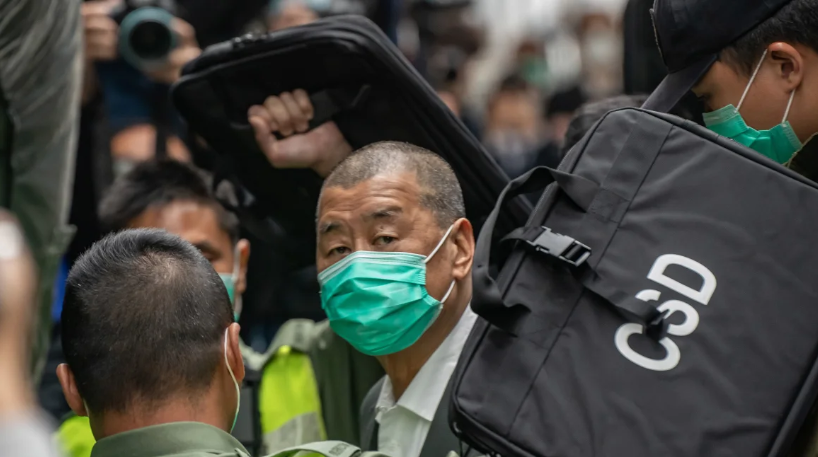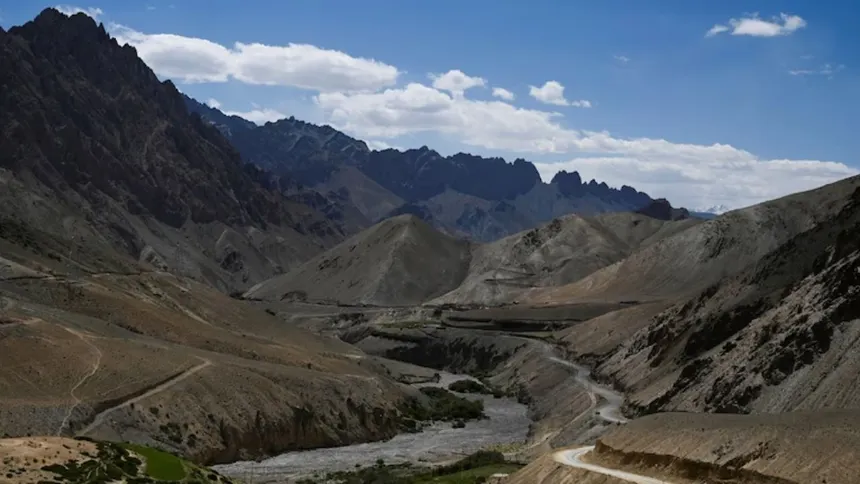For the first time in four years, Hong Kong hears testimony from imprisoned media magnate Jimmy Lai during his trial.
the pugnacious Hong Kong media tycoon whose now shuttered tabloid Apple Daily was a regular thorn in Beijing’s side, took the stand Wednesday in his own defense for the first time in a high stakes national security trial that could send him to prison for life.
The 77 year-old, known for his decades-long support of the city’s pro-democracy movement and outspoken criticism of China’s leaders, hasn’t been heard from since he was arrested nearly four years ago amid a deepening crackdown on dissent.
Dressed in a green cardigan and a brown blazer, a visibly thinner Lai smiled and waved at a public gallery packed with supporters, as he entered the courtroom flanked by officers. His wife and daughter were seated next to Cardinal Joseph Zen, an outspoken former bishop of Hong Kong and a friend of Lai’s.
He faces two counts of colluding with foreign forces, a crime under a sweeping national security law introduced in 2020 that has transformed Hong Kong, as well as a separate sedition charge. He has pleaded not guilty to all charges and faces a maximum sentence of life in prison if convicted.
In his defense, Lai stressed that he had always opposed violence during the anti-government protests of 2019 and called the idea of advocating for Hong Kong and Taiwan independence as “crazy.” Both issues are deemed anathema by Beijing and seen as “red lines.”
The tycoon called allegations of him lobbying for independence a “conspiracy” to trap him, adding that “I never allow any of our staff or our newspaper to mention … this.” He said he never hired anyone at Apple Daily who advocated the idea.
In US court rooms, defense lawyers often advise their clients against testifying in court. But in Hong Kong, court testimony offers a rare chance for detained democracy figures to have their voices heard in a system where national security charges have resulted in months and years of pre-trial detention as well as restrictions on speaking out.
On Tuesday, more than 40 of Hong Kong’s best known pro-democracy figures were sentenced to prison terms of up to 10 years on subversion charges at a separate national security trial. Among them was Joshua Wong, a former student leader and poster child of the city’s once thriving pro-democracy movement, who shouted “I love Hong Kong” before he left the dock.
Lai’s testimony comes just weeks after Donald Trump, who has previously vowed to free the media tycoon, won the White House and has announced a proposed cabinet stacked with multiple China hawks.
Lai said on the stand he had never spoken with Trump, though he knew two people who had unofficial access to the first Trump administration. “I don’t think he knew me. I think his aides knew me and briefed him about me,” said the former businessman.
In later testimony Lai subsequently named the two people as Jack Keane, a retired US army general, and former deputy defense secretary Paul Wolfowitz.
Britain has also called for the release of Lai, who has a British passport. On Monday, UK Prime Minister Keir Starmer raised the issue with Chinese leader Xi Jinping on the sidelines of the G20 summit in Brazil. “We’re concerned by reports of Jimmy Lai’s deterioration,” Starmer told Xi in their first meeting.
High-profile trial
Lai has been in jail since December 2020 awaiting trial on multiple charges linked to his support for Hong Kong’s democracy protest movement through his media business. He was the founder of Apple Daily, a pro-democracy, anti-Beijing newspaper that was forced to shut down in 2021.
The trial, which began in December 2023, is the most high-profile prosecution of a Hong Kong media figure since the city was handed over from British to Chinese control in 1997. It is resuming following a lengthy pause after Lai’s attorneys’ unsuccessful attempt to have the charges dismissed.
Around 100 people waited in line under cold rain on Wednesday morning ahead of the trial testimony, with some expressing support for the media tycoon.
Chiu Mei-ying, a woman in her 70s, said she got to court at 4am this morning. “Lai represents the spirit of Hong Kong,” she told CNN. “After the closure of Apple Daily, there is no real news (to read).”
On Wednesday, Lai began his defense by laying out what he called the core values of Apple Daily, which he said included the rule of law and the pursuit of democracy and personal freedoms.
He also recounted how he built his media empire in the aftermath of Beijing’s bloody crackdown on the pro-democracy Tiananman Square protests in 1989.
As a businessman who had made “a bit of money,” he wanted to be involved in distributing information to the public, he said. “The more information you have, the more you are in the know, the more you’re free,” he told the court.
Prosecutors allege that articles published by Apple Daily violated Hong Kong’s national security law by calling for overseas sanctions against the city’s leaders following the imposition of the national security law in 2020.
Chinese and Hong Kong officials say the law, enacted in the wake of anti-government protests in 2019, has “restored stability” and closed loopholes that allowed “foreign forces” to undermine China.
But critics say it has decimated Hong Kong’s freedoms and altered the city’s legal landscape.
Like all national security trials in Hong Kong, Lai’s trial does not have a jury and is presided over by three judges picked from a national security committee that is approved by Hong Kong’s leader.
Overseas lobbying
Lai, a businessman who made a fortune selling clothing before becoming a publisher, has long been an unapologetic thorn in Beijing’s side, openly using Apple Daily as a vehicle to criticize Chinese leaders since its founding in 1995.
A devout Catholic and a known vocal supporter of Trump, Lai had lobbied extensively overseas for foreign governments to apply pressure on China over Hong Kong, something that infuriated leaders in Beijing. At the height of the protests in 2019, Lai traveled to Washington, where he met with then Vice President Mike Pence and other US politicians to discuss the political situation in Hong Kong.
On Wednesday, Lai said on the stand he had told Pence to “voice out in support of Hong Kong,” without asking for specific actions. “I would not dare to ask the vice-president to do anything,” he said.
Lai had long held a conviction that Trump and the US government should not shy away from supporting Hong Kong’s civil liberties, which are key for the city’s status as a conduit between China and international markets.
“Mr President, you’re the only one who can save us,” Lai said in an interview with CNN in 2020 weeks before he was arrested. “If you save us, you can stop China’s aggressions. You can also save the world.”
Prosecutors have argued that Lai’s actions and his newspaper’s publishing amounted to lobbying for sanctions against Beijing and Hong Kong, something that is prohibited by the national security law. His lawyers have countered that Lai stopped doing so after the national security law came into effect on June 30, 2020.
During Trump’s first term as president, the US government ended Hong Kong’s special trade status and signed into law an act that authorized sanctions on the city’s officials over China’s crackdown in Hong Kong.
Hong Kong’s current leader, John Lee, the city’s security chief during the landmark 2019 protests, is among those on the US sanctions list, which also includes the city’s former leader and current chief justice.
At a news conference earlier this month, Lee did not directly answer questions about how he would deal with Trump’s return to the presidency. He said there should be “respect for the non-interference with local affairs, internal affairs” of the city, and said Hong Kong values the rule of law.
“We desire mutual respect with all countries, including the US, because trade is beneficial for both sides,” Lee said.
Last month, conservative podcast host Hugh Hewitt asked Trump whether he can speak with Xi and free Lai, if he is re-elected.
Trump replied “100%, I’ll get him out” and said that it would be “so easy” to free the detained media tycoon, without providing further details.
But Chinese and Hong Kong leaders have long bristled at any criticism leveled by Western governments at the national security crackdown in Hong Kong and have repeatedly condemned Lai in statements issued both before and throughout his trial.
“Jimmy Lai is the main planner and participant of the anti-China chaos in Hong Kong, and is an agent and pawn of the anti-China forces,” a spokesperson for China’s Foreign Ministry said on Wednesday.













